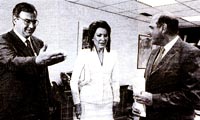
|
Entrepreneurs Set Eyes on Post-Olympic Windfall Having missed the opportunity to reap promotional benefits ahead of the Games, the hosts are now pinning their hopes on future gains from the country’s enhanced image abroad
Athens News No reason to hurry in mobilizing local business around the Athens 2004 money spinner. The really big bucks will come the day after next year’s Olympic fortnight. This seems to be the rationale behind a somewhat belated launch of the formal cooperation between Athens 2004 Organizing Committee (ATHOC), the government and private enterprises, barely a year ahead of the Games. ATHOC president Gianna Angelopoulos-Daskalaki met with Economy and Finance Minister Nikos Christodoulakis on August 25 to sign a memorandum of cooperation establishing an Athens business club for the promotion of Greek products in the wake of the world’s biggest sports jamboree. The blueprint for the partnership is based on the model of the 2000 Sydney Games. Present at the signing ceremony on behalf of the local business community – but not as a signatory – was Odysseas Kyriakopoulos, president and CEO of the Federation of Greek Industries (SEV). With a slight touch of irony in her voice, Angelopoulos-Daskalaki noted that “this is an initiative that should have otherwise been taken for granted had we not signed this memo here today at the finance ministry”. But George Drakopoulos, managing director of the Greek Association of Tourist Enterprises (SETE) was more forthright in his criticism of the delay in taking advantage of the Games for the promotion of the country’s only heavy industry. “Tourism is the principal sector where the economic benefits from hosting the Olympics are obvious, even to a child,” he told the Athens News. “And yet, neither the government nor EOT (the National Tourist
&Let’s face it,” Drakopoulos stressed. “We have forsaken the chance to make the Olympic theme the linchpin of our tourist publicity drive prior to the Games. Let’s at least hope that it is not too late to plan our steps to reap the benefits after the Games.” Future hurdles The signatories of the Athens 2004 memo indirectly admitted that the focus of their endeavor is the business outlook after – rather than before, or during – the 2004 Olympics. &We are taking an initiative to mobilize Greek enterprises as best we can so that they can promote their products prior to, during and – mainly – after the 2004 Olympic Games,” a beaming Christodoulakis told reporters following the signing of the memo. “The Games are not only a fortnight event but a national long-term investment, offering the opportunity to move our country forward socially and culturally as well as economically,” he said. According to Drakopoulos, there are institutional as well as bureaucratic obstacles to the effective mobilization of financial resources for the promotion of the country as a tourist destination. “This requires a long-term publicity campaign and versatile public relations, especially as regards the media, which only highly specialized, international PR firms could provide. But at the start of every tourist season, EOT does not even know the amount of money from the public investment budget that would be allocated for tourism; and every year, there has to be a new tender for the EOT publicity contract,” Drakopoulos explained. SEV officials have also asked for a more active economic diplomacy, focusing on promoting Greek products abroad. Greek exports have been declining for most of the past 10 years. “We are making a large investment as a country, investing not only in infrastructure, but also in exports, the promotion of investment plans, making use of all the know-how and production in Greece, which has certainly been upgraded prior to the Olympic Games and is being upgraded every day,” said Kyriakopoulos. He announced that the finance ministry will provide SEV with 5 million euros to strengthen its campaign to promote Greek products during the Olympics. For the ATHOC head, promoting Greek business largely depends on the enhanced image that will be projected abroad once the progress attained in preparing for the Games becomes visible. “The Olympics give Greece the chance to showcase both its history and its modern image, but what is even more important is for all the preparations that we make in all areas, especially the economy, also to serve as a platform providing opportunities for the future,” said Angelopoulos-Daskalaki. &The important thing is not only to have the opportunity during the 17 days of the Games to showcase Greece’s achievements and all its preparations in so many areas – from technology and human resources to traffic conditions and the level of service to be provided to the people who will be here. We also have to continue at this pace after the Games, making use of all the know-how and human potential.” Christodoulakis added that the government will lend its organizational know-how to the next summer Games organizers, Beijing. A liaison office in China will try to involve as many Greek firms as possible in the preparation of the 2008 Olympics. |
|

